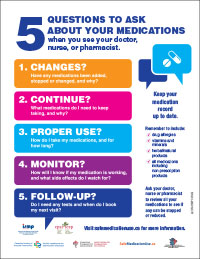When Medications Are Not Available Due to a Drug Shortage
2019-11-13
-

Your medication may not be available at the pharmacy due to a drug shortage. This problem can happen for many reasons. Sometimes the company that makes the medication does not have enough of one of the ingredients. Other times, the company has stopped making your medication altogether.
If the medication that your doctor has prescribed for you is not available due to a shortage, you may be given the same medication in a different strength or a different form. For example, you may be given a syrup instead of a pill. Sometimes, however, you will have to change to a different or a new medication. Most of the time, this can be done safely and easily. In some cases, you will have to take the new medication in a different way from the old medication. Unfortunately, this type of change can increase the chance of mistakes with the new medication.
SafeMedicationUse.ca received a report about a consumer who was taking a medication to treat high blood pressure. The consumer found it difficult to swallow the big pills, so a health care provider gave instructions to crush the pill. When that form of the medication was no longer available, the consumer was given the same medication in a different pill form. This new pill had to be swallowed whole because crushing the pill could lead to very low blood pressure. Fortunately, the consumer asked the right questions at the pharmacy, and the pharmacist was able to explain why the new pills had to be swallowed whole.
-

SafeMedicationUse.ca suggests the following actions if one of your medications needs to be changed because it is not available:
-
Talk to your doctor or pharmacist if you have any questions about changing to a different or a new medication.
-
Use the 5 Questions to Ask to learn about your new medication. Make sure you know how much to take and how often. Find out whether there are any other things you need to know about the new medication, such as any change in how the medication should be taken.
-
If you still have some the old medication at home, stop taking it and return it to your pharmacy.
Medication safety bulletins contribute to Global Patient Safety Alerts
This newsletter was developed in collaboration with Best Medicines Coalition and Patients for Patient Safety Canada.
Recommendations are shared with healthcare providers, through the ISMP Canada Safety Bulletin, so that changes can be made together.
|

